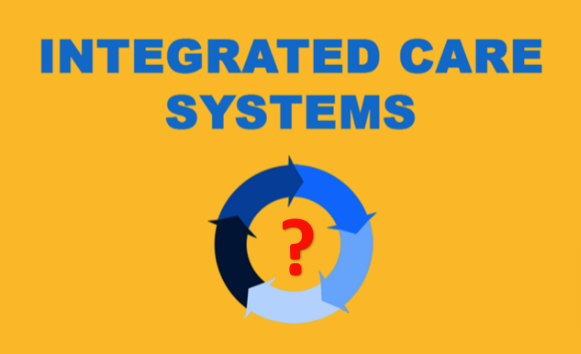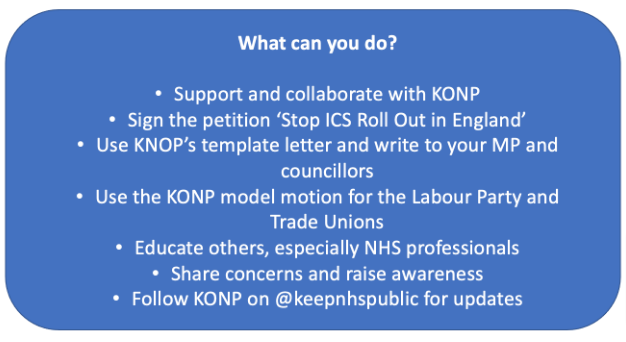By Harry LeitchIn a series of guest blog posts by Harry Leitch, Integrated Care Systems will be explained, and key concerns highlighted. The question will then be asked, what do these changes mean for communities? "Although seen by the media as suggesting the role of the private sector will be reduced, the proposed legislation, if passed, will enact the current government’s wish to further fragment, destabilise and privatise our NHS." - Keep Our NHS Public During a pandemic that has revealed the necessity of universal, comprehensive and equitable healthcare, a top-down reorganisation of the NHS is underway. In accordance with proposals from the 2019 Long Term Plan, NHS England (NHSE) is transforming the NHS into Integrated Care Systems (ICS). For Keep Our NHS Public (KONP) and other campaign groups, these moves represent a severe threat to the NHS and a failure to achieve the increased and sustained funding required. Key concerns include use of a population health perspective, lack of regulation and increase presence of private companies within the NHS. What are ICS? In sum, ICS are collaborations between NHS providers and commissioners that bring together local authorities and other partners within a defined geographical area. Together, they plan how care and health services will serve the needs of populations. NHS trusts and foundation trusts will both become members of local ICS and form partnerships with other providers within the system. ICS are defined by NHS England as: ‘NHS organisations, in partnership with local councils and others, take collective responsibility for managing resources, delivering NHS standards, and improving the health of the population they serve’.
The case for ICS Key driving forces for the changes to healthcare as part of ICS are the increasing number of elderly people and people with long-term conditions that require care. A need for reduced barriers to services and increased care in the community has been identified, and ICS have been suggested to offer a solution (King’s Fund, 2021). It is claimed that ICS will overcome traditional divisions in care and limit the ‘disjointed care’ that many people have experienced previously (NHSE, 2021a). A crucial aim of ICS is also to reduce inequalities between different groups in society, as well as create new partnerships between health and care providers (NHSE, 2021a). It must be noted that whilst the aims of ICS appear positive and the related demographic changes are undeniable, campaigners have highlighted a series of concerns. Key Concerns Whilst upholding the marketisation of the NHS, ICS are internally managed in a manner that furthers privatisation. The following examples paint a picture of increasing privatisation as part of ICS and reveal changes to the running of NHS services upon which communities depend. Population Health Perspective This approach depends heavily on mass collection of data from a range of care settings in order to inform budgeting. The aim is to cut patient ‘demand’ and increase cost-effectiveness, with the focus of the NHS shifting towards achieving data targets for populations (KONP, 2020). According to the definition of population health management provided by Deloitte - who are highly involved in provision of these services - changes in patterns of service delivery, alongside new clinical positions and ‘flexible’ working are key. Importantly, research has indicated that a population health management approach is not effective in reducing demand or costs of services (KONP, 2021). Patients are also expected to become more ‘self-sufficient’ in the management of their own care, to adopt more pro-health behaviours and improve medication adherence whilst also becoming more ‘health literate’ (Deloitte, 2019). This model anticipates a change in healthcare in which patients expect less from health services and the private sector is able to exploit new areas as they open up (Patients4NHS, 2021). Furthermore, the increased access of private companies to NHS patient data will be achieved through the contracting out of population health management. This data is highly valuable to private companies for the purposes of research and product development (Patients4NHS, 2021). It is not yet clear how this level of data access will interact with patient consent or confidentiality. Importantly, population health management creates the databases required by health insurance providers within private healthcare systems (Patients4NHS, 2021).
Lack of regulation Suggested changes to the law involve converting the NHS into an unregulated market. Proposals include recommendations that NHS services are exempt from Public Contracts Regulations 2015, which is intended to provide greater discretion to commissioners when procuring services (KONP, 2020). This would mean that ICS could choose to overlook formal procurement processes, making it legal for contracts to be handed out based on personal relationships in a corrupt manner (Wortley, 2021). Such changes are particularly significant when considered alongside the aim of NHS England to allow each ICS independence when appointing its governing board; a move that would enable boards to include representatives from private providers (KONP, 2020).
Private companies and patient care ICS are based on provider collaboratives between NHS organisations and others. Yet, the make up of these collaboratives is not under scrutiny or control. The possibility therefore exists that providers in these collaboratives may be private companies with no connection to local communities.
The problem with private suppliers As part of ICS management and development, fast and easy access to private suppliers has been established. NHS England has created the Health Systems Support Framework (HSSF), a framework enabling quick access to private suppliers. The HSSF contains a list of 83 companies accredited to provide services. Of these suppliers, 76 are private companies, a third of which are American and include IBM, McKinsey, Deloitte, Cerner and Centene (KONP, 2020). The framework contracts allow companies to be used in place of NHS management when creating policy and making decisions. Services available for these contracts include electronic patient records systems, patient empowerment, demand management, medicines optimisation and many others (NHSE, 2021).
Final Thoughts Understanding ICS and its implications can be challenging. Jargon and misleading use of language makes this subject less much less accessible. Nonetheless, concerns such as increasing the scope for privatisation hold serious implications for communities. It is crucial that campaign efforts increase awareness and understanding around ICS. Below are a series of actions that you can take to contribute to the KONP campaign.
Author Harry Leitch works within Camden and Islington NHS Trust as an Assistant Psychologist. Passionate about perspectives that understand mental health within its socio-political context, they joined Psychologists for Social Change in 2019. They also campaign for Keep Our NHS Public and the Socialist Health Alliance. Reference List
0 Comments
Your comment will be posted after it is approved.
Leave a Reply. |
AuthorPSC is a network of people interested in applying psychology to generate social and political action. You don't have to be a member of PSC to contribute to the blog Archives
February 2022
Categories
All
|
PSYCHOLOGISTS FOR SOCIAL CHANGE
- Home
- About
-
Groups
- Blog
-
Position statements
- UK >
-
Cymru / Wales
>
- Consultation Responses
- Housing Support Funding
- Connecting the Dots Report
- Chemical Imbalance Myth
- Review of use of dx PD
- UK Inhumane Removal Plans
- WG LGBT+actionplan
- Ty Coryton
- Commission on Race and Ethnic Disparities: The Report
- ECT Review
- Black Lives Matter
- COVID 19 and Internet Access
- Save the T4CYP Programme
- Support the Mind over matter Report
- UN Report on Extreme Poverty in the UK Letter
- England >
- Ireland >
- Northern Ireland
- Scotland
-
Campaigns
- Join our mailing list


 RSS Feed
RSS Feed
